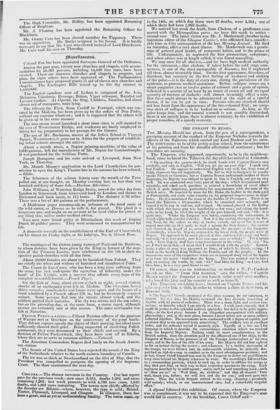CHOLERA.—The disease increases in the Country. Our last report gave
for the previous week—new cases 3,185, deaths 1,282, and cases remaining 1,282: last week presents us with 4,798 new cases, 1,646 deaths, and 1,891 cases remaining. The towns now chiefly afflicted by the disorder ere Bilston—where, however, the type is mild; Bristol, Exeter, Plymouth, Liverpool, and Glasgow. In Glasgow, there has been agreat,.and us yet an undiminishing fatality. The entive scasts,,np
to the 14th, on which day there were 27 deaths, were 4,164; out of which there bad been 1,993 deaths.
We noticed last week the death, from Cholera, of a gentleman cone nected with the Metropolitan press : we have this week 'to notice - second case. The latter victim was Mr: J. Motherwell (brother to tha ingenious editor of the Glasgow Courier), who officiated fora consider- able time as City correspondent of the late Morning Journal. He died on Saturday, after a very short illness. Mr. Motherwell was a gentle- man of general good health, of temperate habits, and in the prime of life. Unfortunately, he neglected the first premonitory symptoms; and when advice was at length called, it was found unavailing.
We may once for all observe,—and we have high medical authority for the statement,—that cholera, if taken before the cold stage 'com- mences, is one of the most manageable of diseases; but if neglected till then, almost invariably fatal. On the first appearance, therefore, of diarrhma, but certainly on the first feeling of weakness and sinking of the pulse,—it is the duty of every one, during the prevalence of the epidemic, to procure medical assistance. Before collapse comes on, a smart purgative (ten or twelve grains of calomel and a grain of opium, followed in a quarter of an hour by an ounce of castor oil and an equal quantity of tincture of rhubarb) will almost invariably effect a cure. But these ought always to be administered at the sight of a careful doctor, if he can be got in time. Persons who are attacked should not lose heart from the appearance of the rice-coloured fluid ; no symp- tom short of collapse is to be looked on as serious. As long as the pulse keeps firm, and the natural warmth is not sensibly diminished, there is not merely hope, there is almost certainty, by the exhibition of proper remedies, of a speedy recovery.


























 Previous page
Previous page